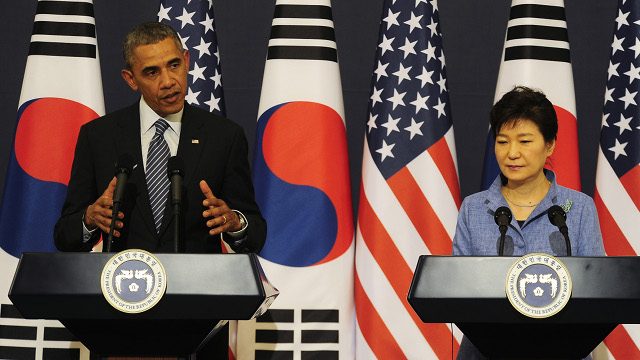SUMMARY
This is AI generated summarization, which may have errors. For context, always refer to the full article.

SEOUL, South Korea – North Korea will gain “nothing” by making threats, US President Barack Obama said Friday, April 25, warning it of sanctions with “more bite” if it went ahead with a fourth nuclear test.
Speaking in South Korea as satellite images revealed the North could be preparing for another test, Obama stressed that Washington and Seoul stood “shoulder to shoulder” in their refusal to accept a nuclear North Korea.
Even China, the North’s only major ally, was becoming alienated by its provocative behavior, he said on the second leg of his Asian tour.
“Threats will get North Korea nothing, other than greater isolation,” Obama said at a joint press conference with South Korean President Park Geun-Hye.
“China is beginning to recognize that North Korea is not just a nuisance but a significant problem for their own security,” he added.
North Korea-watchers have puzzled over whether the test preparations at the Punggye-ri test site they have seen via satellite images are real, or bravado aimed at stealing the limelight during the US president’s tour.
But the latest images suggested increased movement of vehicles and materials near what are believed to be the entrances to two completed test tunnels, the US-Korea Institute at Johns Hopkins University said on its closely followed 38 North website.
Also visible were probable command and control vehicles intended to provide secure communications between the test site and other facilities.
North Korea has conducted 3 nuclear tests, in 2006, 2009 and 2013.
The 38 North analysis noted that preparations for the test in February last year had peaked two or 3 days before detonation.
Asked how the international community might react, Obama said it would be necessary to look at “additional ways” to apply pressure, including “further sanctions that have even more bite.”
Obama’s tough talking on what he called “the most isolated country in the world” stood in marked contrast to the warm words of sympathy he had for his hosts, still racked with grief over the 300 people dead or missing after a ferry full of schoolchildren capsized last week.
“I’m very mindful that my visit comes at a time of mourning for the people of this nation,” he said ahead of talks with Park at the presidential Blue House.
“I just want to express, on the part of the American people, condolences for the incredible loss.”
While a US presidential visit would normally be expected to command the lion’s share of attention in South Korea, the country remains preoccupied with the misery wrought by the sinking of the ferry.
Television coverage of Obama’s activities was limited, with the focus still on events in Jindo, where divers were racing against time and tide to recover the 119 bodies still believed trapped in the sunken vessel.
Bad weather was expected to close in on Saturday, hampering the effort.
‘Egregious violation of human rights’
Obama’s four-nation tour of Asia had begun in Japan, where he offered Prime Minister Shinzo Abe assurances that the US was treaty-bound to act if China moved militarily against Japanese-controlled islands at the center of a bitter territorial dispute.
And in Seoul Friday he broached another regional faultline when he said Japan’s wartime system of sex slavery “was a terrible, egregious violation of human rights.”
“Those women were violated in ways that even in the midst of war were shocking,” he said. “They deserve to be heard, they deserve to be respected. And there should be an accurate and clear account of what happened.”
South Korea and other nations accuse Japan of failing sufficiently to atone for the forced recruitment of so-called “comfort women” to service its troops before and during World War II.
The issue remains a major irritant in relations between Tokyo and Seoul, and a frustration to Washington, which wants its two major allies in the region to act together against North Korea and forge a united front against a rising China.
“I think (Japanese) Prime Minister (Shinzo) Abe recognizes this and certainly the Japanese people recognize that the past is something that has to be recognized honestly and fairly.”
After a formal dinner with Park later in the day, Obama on Saturday will visit some of the 28,500 US troops stationed in South Korea, before heading on to Malaysia and the Philippines. – Rappler.com
Add a comment
How does this make you feel?
There are no comments yet. Add your comment to start the conversation.